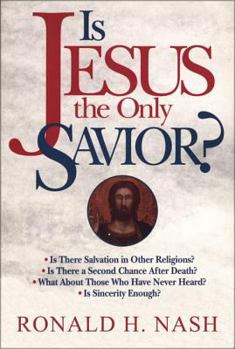Is Jesus the Only Savior?
Select Format
Select Condition 
Book Overview
A compelling and urgent case for Jesus Christ as the one and only way to salvation. Today, professing that Jesus Christ is the only way to approach God and receive his salvation may seem to some like a form of intolerance or arrogance. A growing number of Christian intellectuals, pastors, and leaders are favoring a more inclusive view of a person's path to salvation. But what does this mean in practice? Are there biblical...
Format:Paperback
Language:English
ISBN:0310443911
ISBN13:9780310443919
Release Date:July 1994
Publisher:Zondervan Academic
Length:192 Pages
Weight:0.10 lbs.
Dimensions:0.6" x 6.0" x 9.0"
Customer Reviews
3 ratings
Powerful Argument for Exclusivism
Published by Thriftbooks.com User , 15 years ago
Ronald Nash's book Is Jesus the Only Savior? is a scholarly response to the oft-asked question of our generation. Nash takes the current answers given by many evangelicals and non-evangelicals alike and compares them to Scripture and makes a terrific case for answering "yes" to the question. First, Nash takes on the pluralist position which answers the question of Jesus' exclusivity with a resounding "NO!" John Hick is the main proponent of pluralism that Nash deals with in the book. Chapter by chapter, paragraph by paragraph, Nash shows how far Hick is from traditional Christianity and the plain teaching of the Scriptures. In the book's second half, Nash takes on the inclusivist position which is making inroads into evangelicalism. This position answers the question "Is Jesus the Only Savior" by saying "Yes, but..." Clark Pinnock's version of inclusivism is targeted by Nash's devastating critique of the doctrine. Is Jesus the Only Savior? may be too scholarly for the average layperson. You will probably not hand this book to someone who asks you questions about the uniqueness of Jesus. However, Nash's argumentation provides you with the resources necessary to help you answer the question yourself.
Very good, but could have been better
Published by Thriftbooks.com User , 22 years ago
This effort by Ron Nash is good and worth reading. There are a number of very good things about this book, but there are also a couple of things about it that in my view, do not warrant a five star rating.Nash attempts to argue in favor of an exclusivist view of salvation mostly by trying to present negative aspects of both the pluralist and inclusivist views. He therefore devotes the first part of the book to critiquing the pluralism of John Hick, and the second part to critiquing the inclusivism of Pinnock and Sanders.His critique of Hick's pluralism was easily the best part of the book. Nash methodically analyzes the pluralism of John Hick and by the end of the critique, the reader is left with the impression that Hick's pluralism has been thoroughly discredited not only on intellectual grounds, but on emotional ones as well. As in his other writings, one of Nash's analytical strengths is his insistence on quoting from relevant sources at length. Nash dedicates a significant part of the pluralist section on quoting from John Hick and letting Hick's own words be the basis for Nash's analysis. Nash's conclusions about Hick's philosophy and the ramifications thereof become all the more convincing as a result. In my own view, I cannot say that Nash had the same level of success in analyzing inclusivism in section 2 as he had with demonstrating the falsity of pluralism in section 1. It's not that this section is bad, because it isn't, there is a lot about his analysis that is good, particularly his analysis of PME and how Pinnock's embrace of it totally contradicts the inclusivist worldview that Pinnock also embraces. But particularly in his analyses of the Scriptural reference that inclusivists often use to support their worldview, I felt that Nash's critique was too summary oriented and not sufficiently detailed to mount a convincing case against inclusivism. To his credit, I thought that Nash did a good job in the very last chapter of rescuing his exclusivism argument a bit, but I still felt that his analysis of inclusivism needed to be more detailed in order for him to effectively demonstrate what he was trying to demonstrate.The one other negative aspect of the book, in my opinion, is that Nash does not present a positive case for exclusivism. His argument for exclusivism is based almost completely on negatively critiquing pluralism and inclusivism. And while these critiques certainly needed to be done in order to demonstrate that these worldviews run into big intellectual and emotional problems when thoroughly thought through, Nash nonetheless should have put forth a positive defense of exclusivism in order for this book to truly achieve its mission. This absence, coupled with what I believed to be the too top level nature of his Scriptural critique of inclusivism, persuade me to give the book 4 stars instead of 5. Having said that, his critique of pluralism is top grade, and even his critique of inclusivism, while not perfect,
This book is back in print
Published by Thriftbooks.com User , 24 years ago
This book is back in print and is readily available from its original publisher, Zondervan Publishing Company in Grand Rapids, Michigan. The book is perhaps the major work that critiques the opinions of pluralists like John Hick and inclusivists such as Clark Pinnock. It defends the claim that Jesus IS the only Savior.





